

RSA Shorts - The Power of Empathy. Everything Doesn't Happen For A Reason — Tim Lawrence. I emerge from this conversation dumbfounded.
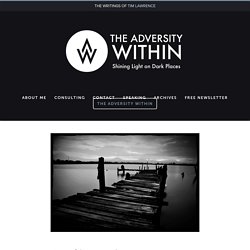
I've seen this a million times before, but it still gets me every time. I’m listening to a man tell a story. A woman he knows was in a devastating car accident; her life shattered in an instant. She now lives in a state of near-permanent pain; a paraplegic; many of her hopes stolen. He tells of how she had been a mess before the accident, but that the tragedy had engendered positive changes in her life. And then he utters the words. Everything happens for a reason. That's the kind of bullshit that destroys lives. It is amazing to me that so many of these myths persist—and that is why I share actionable tools and strategies to work with your pain in my free newsletter.
RSA Animate: The Truth About Dishonesty. Story of My Life: How Narrative Creates Personality. In Paul Murray's novel Skippy Dies, there’s a point where the main character, Howard, has an existential crisis.
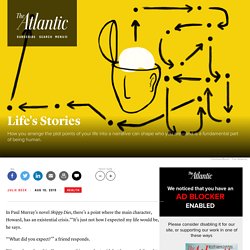
“‘It’s just not how I expected my life would be,'" he says. “‘What did you expect?’” A friend responds. Why 'Things Fitting Perfectly Into Other Things' Is So Satisfying. Oh!

Why, hello. I didn't see you there. Come, come—sit down by the warm glow of the computer and let me spin you a yarn. Effort Is Not the Enemy of Compassion - Leslie Jamison. My job title is medical actor, which means I play sick.
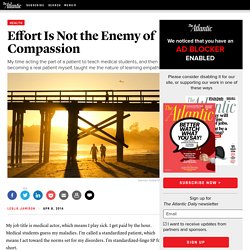
I get paid by the hour. Medical students guess my maladies. I'm called a standardized patient, which means I act toward the norms set for my disorders. Jack Kornfield: The Ancient Heart of Forgiveness. A Guide for the Perplexed: Mapping the Meaning of Life and the Four Levels of Being. By Maria Popova How to harness the uniquely human power of “consciousness recoiling upon itself.”
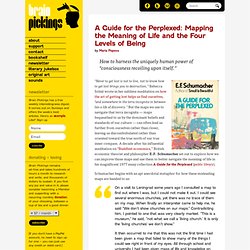
“Never to get lost is not to live, not to know how to get lost brings you to destruction,” Rebecca Solnit wrote in her sublime meditation on how the art of getting lost helps us find ourselves, “and somewhere in the terra incognita in between lies a life of discovery.” But the maps we use to navigate that terra incognita — maps bequeathed to us by the dominant beliefs and standards of our culture — can often lead us further from ourselves rather than closer, leaving us discombobulated rather than oriented toward the true north of our true inner compass. A decade after his influential meditation on “Buddhist economics,” British economic theorist and philosopher E.F. Kierkegaard on Our Greatest Source of Unhappiness. By Maria Popova Hope, memory, and how our chronic compulsion to flee from our own lives robs us of living.
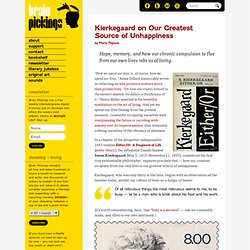
“How we spend our days is, of course, how we spend our lives,” Annie Dillard memorably wrote in reflecting on why presence matters more than productivity. “On how one orients himself to the moment depends the failure or fruitfulness of it,” Henry Miller asserted in his beautiful meditation on the art of living. And yet we spend our lives fleeing from the present moment, constantly occupying ourselves with overplanning the future or recoiling with anxiety over its impermanence, thus invariably robbing ourselves of the vibrancy of aliveness. Kierkegaard, who was only thirty at the time, begins with an observation all the timelier today, amidst our culture of busy-as-a-badge-of-honor: Of all ridiculous things the most ridiculous seems to me, to be busy — to be a man who is brisk about his food and his work.
The unhappy one is absent. Consider first the hoping individual. Donating = Loving. Dan Gilbert: The surprising science of happiness. Dan Gilbert: The psychology of your future self. Brené Brown on Blame. There's More to Life Than Being Happy - Emily Esfahani Smith. "It is the very pursuit of happiness that thwarts happiness.
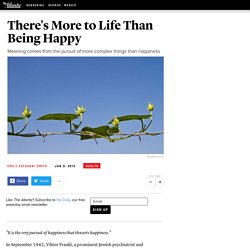
" In September 1942, Viktor Frankl, a prominent Jewish psychiatrist and neurologist in Vienna, was arrested and transported to a Nazi concentration camp with his wife and parents. Three years later, when his camp was liberated, most of his family, including his pregnant wife, had perished -- but he, prisoner number 119104, had lived. In his bestselling 1946 book, Man's Search for Meaning, which he wrote in nine days about his experiences in the camps, Frankl concluded that the difference between those who had lived and those who had died came down to one thing: Meaning, an insight he came to early in life. Meaning Is Healthier Than Happiness - Emily Esfahani Smith. Health People who are happy but have little-to-no sense of meaning in their lives have the same gene expression patterns as people who are enduring chronic adversity.
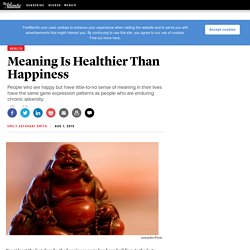
What Writing Has in Common With Happiness. By Heart is a series in which authors share and discuss their all-time favorite passages in literature.
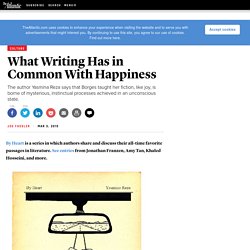
See entries from Jonathan Franzen, Amy Tan, Khaled Hosseini, and more. The final line of an enigmatic Jorge Luis Borges poem became the title for Yasmina Reza's latest book, Happy Are the Happy. For Reza, Borges’ poem suggests that happiness, which people tend to talk about as achievable and context-dependent, is dispensed more mysteriously than we like to think. In our conversation for this series, we discussed the ways contentment transcends our understanding—and how works of literature, too, are more than what their authors understand them to be. Happy Are the Happy features 18 different narrators, each of whom gets to command the reader's attention for at least one chapter. Reza’s books—novels, plays, and an unorthodox book-length profile of Nicolas Sarkozy—have been translated into more than 30 languages. She lives in Paris and spoke to me in New York City.
The price of invulnerability: Brené Brown at TEDxKC.